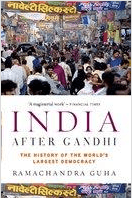India After Gandhi
India after Gandhi: The History of the World's Largest Democracy is a book by Indian historian Ramchandra Guha published by HarperCollins in August 2007.[1][2] A history of the Indian nation after it gained independence from the British Empire on 15 August 1947, India after Gandhi was chosen Book of the Year by The Economist, The Wall Street Journal and Outlook, among others. The book won the 2011 Sahitya Akademi Award for English.[3] The book was one the best non-fiction books of the decade (2010-2019) as per The Hindu.[4]
 | |
| Author | Ramchandra Guha Hindi Translation by Sushant Jha |
|---|---|
| Country | India |
| Language | English |
| Subject | History of the Republic of India, Politics of India |
| Genre | Non-fiction |
| Publisher | Harper Collins |
Publication date | 24 July 2007 |
| Media type | Print (hardcover and paperback) |
| Pages | 898 pp |
| ISBN | 978-0-330-50554-3 |
India After Gandhi was translated into Hindi as Bharat Gandhi Ke Baad by India Today journalist Sushant Jha, an alumnus of the Indian Institute of Mass Communication, New Delhi.[5]
Background
In November 1997, Peter Straus, then head of Picador, met Guha and suggested that he write a history of independent India. Straus had read an article by Guha in the Oxford journal Past and Present. He suggested that since Indian historians typically stopped their narratives with Indian independence in 1947, a scholarly analysis of modern Indian history post-independence would be of interest. Guha signed a contract in March 1998, with a delivery date for the book specified for March 2002.[6]
In writing the book, Guha consulted the private papers of several important Indian personalities, as well as newspaper records, housed at the Nehru Memorial Museum and Library. The private papers of Indian independence activist and politician C Rajagopalachari and PN Haksar, Indira Gandhi's principal secretary 1967 and 1973, were especially useful to Guha's research. Guha sent across his final draft to Straus in 2006, and the book was published in 2007.[6]
References
- Amit Chaudhuri (21 April 2007). "Review: Midnight's citizens". The Guardian.
- Chotiner, Isaac (26 August 2007). "All in the Family". New York Times. Retrieved 27 August 2018.
- "Poets Dominate Sahitya Akademi Awards 2011" (PDF) (Press release). Sahitya Akademi. 21 December 2011. Archived from the original (PDF) on 8 May 2012. Retrieved 21 December 2011.
- "Best non-fiction books of the decade".
- "Bharat Gandhi Ke Baad". Penguin India. Retrieved 7 January 2017.
- Guha, Ramachandra (18 June 2017). "How Ramachandra Guha came to write 'India After Gandhi', the first popular post-1947 history". Scroll.in. Retrieved 23 May 2018.